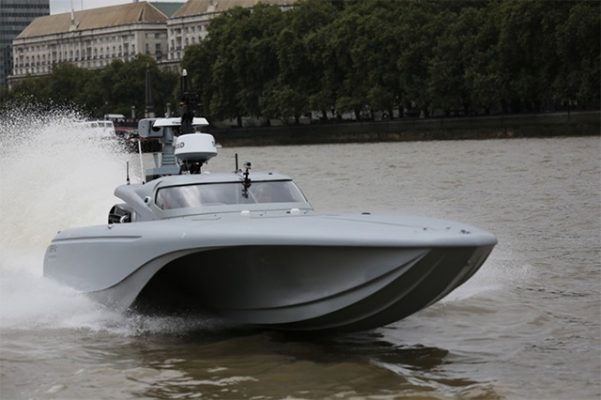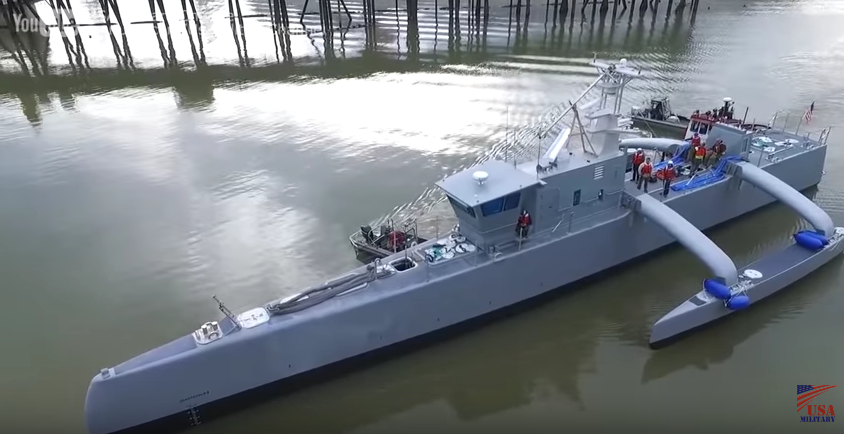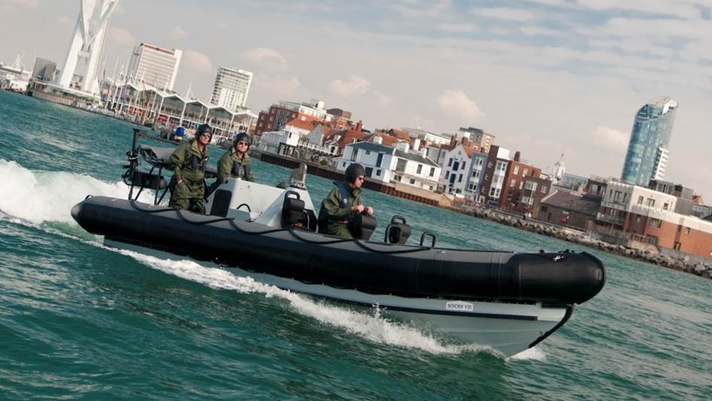Called Maritime Autonomy Surface Testbed (MAST), the drone boat has undergone sea trials ahead of the Unmanned Warrior exercise in the autumn.
The Royal Navy’s latest vessel – MAST – has been put through its paces on the River Thames ahead of so-called “robot wars” next month.
The 32-foot drone boat is one of over 40 Autonomous Systems taking part in Unmanned Warrior 2016 in October, off West Wales and North West Scotland and the Western Isles.
MAST, which is based on the innovative Bladerunner hull shape, is being developed by Portchester-based ASV Ltd, under research funding from the Defence Science and Technology Laboratory (Dstlis).
It is designed to reach high speeds. Various levels of autonomy include basic remote control up to autonomous navigation.
The boat senses other vessels in the immediate vicinity and is programmed to avoid them in a safe manner.

MAST flies by Superyacht A on the Thames. Credit: Royal Navy
The Royal Navy said the avoidance algorithms are designed to comply with internationally mandated collision regulations.
When operating on a busy waterway, such as the River Thames, the craft is operated with a coxswain on board ready to take control.
First Sea Lord and Chief of Naval Staff, Admiral Sir Philip Jones, said: “The growing scale of Unmanned Warrior is a clear demonstration of the Royal Navy’s ambition to lead and win through technological innovation.”
“Unmanned maritime systems will change how we operate, but they’re just the start. Our pursuit of new technologies and ideas – from big data to 3D-printing – will ensure we remain one of the most capable and successful navies in the world,” added Sir Philip.
MAST does not carry weapons, but is designed to explore autonomous capabilities and support non-lethal surveillance and reconnaissance roles.

Sea trials on the River Thames. Credit: Royal Navy
The work is funded through Defence Science and Technology Laboratory, which conducts research on behalf of the Royal Navy and the other UK armed forces.
The work is being conducted by civilian manufacturers ASV Ltd & Roke Manor Research, with support from Cambridge Pixels, Seebyte and Chess Dynamics.
Fleet Robotics Officer Commander, Peter Pipkin, said: “This is a chance to take a great leap forward in Maritime Systems – not to take people out of the loop but to enhance everything they do, to extend our reach, our look, our timescales, our efficiency using intelligent and manageable robotics at sea.”

MAST is put through its paces. Credit: Royal Navy
During Unmanned Warrior in October, engineers and scientists will be able to demonstrate state of the art technology to the Royal Navy and representatives from other NATO countries.
The Royal Navy says it is the biggest event of its kind, and will explore the ideas that “will help shape the future of Naval Warfare for decades to come”.
It is linked with the regular Joint Warrior fleet Exercise and aims to test systems in an operational environment.
Pictures: Rolls-Royce announces crewless smart boats by 2020
"As disruptive as the smartphone": Rolls-Royce Marine says remote and autonomous commercial shipping will become a reality by the end…
Upgrade for Sea Hunter – the US Navy’s 32ft submarine-hunting drone boat
The US Navy's 132-foot drone trimaran, Sea Hunter, which targets hard-to detect diesel-electric submarines, could be weaponised
Royal Navy orders next generation boats to fight piracy and drugs
BAE Systems has been awarded £13.5m by the Royal Navy to build 60 new lightweight rapid response boats for the…






